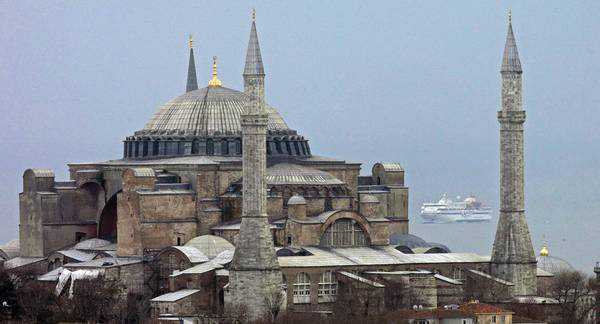By Nichole Sobecki
ISTANBUL, Turkey — Leaning back into a maroon barber’s chair, its dark leather cracked with age, Onur Karadogan flips through a dusty catalogue of moustache styles.
“An Islamist will ask for this one,” he said, pointing to a neatly trimmed, almond-shaped example, bringing two fingers together to illustrate the two millimeters of space that the Koran deems must exist between the end of the upper lip and the beginning of the whiskers.
“These ones,” he said, upon reaching a brittle page covered in images of dark-haired men with thick, walrus-style moustache of the Marx variety, “are more for the leftists.”
In his 16 years of experience as a barber, Karadogan has become an expert at shaping these bushy declarations. Men don’t wear their politics on their sleeve here, they write them across their upper lip.
With nationwide elections on June 12, political parties have cranked their campaigns into full gear. Prime Minister Recep Tayyip Erdogan, who is running for a third consecutive term in office, appears set to win a comfortable majority. If he does win, he will become the longest-running Turkish prime minister since legitimate elections — ones that weren’t blatantly manipulated by the ruling party — began in 1950.
This time around though, the leading opposition candidate, Kemal Kilicdaroglu, is banking on a secret weapon — and it’s plastered right in the center of his round-faced mug.
“Turkish politics adheres to a simple rule: wives and their moustache-wearing husbands like moustache-wearing men as their leaders,” wrote Soner Cagaptay, a researcher at the Washington Institute for Near East Policy, in an op-ed published in Monocle.
A former civil servant, Kilicdaroglu swept to the leadership of the main secular opposition party, the Republican People’s Party (CHP) last spring amid a sex-tape scandal that ousted the long-standing (and clean-shaven) party chairman, Deniz Baykal.
Although these days the moustache is not as popular as it was in past decades, when there was nary a whiskerless face to be found on Turkey’s streets, they remain popular among the working class, which accounts for the majority of the voting public.
The facial hair has not always been so politically expedient here. Turkey, in fact, has had a rather tumultuous history with the moustache. Mustafa Kemal Ataturk shaved his iconic moustache while fighting to establish the republic — and the military remains the one institution in Turkey were moustaches are not welcome.
Following a coup in 1980, Turkey’s generals banned university professors from growing beards, which were then a symbol of left-wing intellectuals. By the late 1990s tensions had shifted as an emerging class of religiously conservative students clashed with security forces when beards were banned at universities altogether for being too Islamic.
“When you put rules on people’s bodies, they try and challenge you,” said Mustafa Gurbuz, a Turkish professor of sociology at the University of Connecticut. “How you dress, how you shave, they become politicized.”
“Over time these shapes became understood by society. It was a type of political code that everyone could read.”
Intellectuals lay claim over the goatee, while members of the religious Gulen community are generally clean-shaven. An ultranationalist? They tend towardbushy, with the ends sloping downward at the corner of the mouth — an echo of the crescent shape found on the Turkish flag.
Erogan (who favors an almond-shaped “stash”) melds street smarts with a brash charisma that has provided some of the popularity he has used to lead a resurgence of Islamic-oriented politics in the Muslim world’s most secular democracy.
Born to a poor family from the shores of the Black Sea, the prime minister played soccer professionally and worked for Istanbul’s transportation authority — before, that is, they asked him to shave his moustache. He refused on religious grounds, and with the end of one career began another: politics.
Perhaps what is most important to Erdogan’s appeal is the way in which he represents a shift away from the traditional vanguards of Turkey’s political system. Kilicdaroglu is following suit, attempting to rebrand his struggling party to compete with the Erdogan’s broad appeal.
An Alevi Kurd from humble origins in Turkey’s east, Kilicdaroglu (with bushy, left-leaning whiskers) is going after the ruling party, known as AKP, with accusations of corruption. Accusing Erdogan’s party of losing touch with the common man, Kilicdaroglu pledged to bring his party back to its center-left roots, prioritizing social policies, unemployment and poverty — and never once mentioning secularism.
The quite demeanor of Kilicdaroglu has earned him the nickname “the Turkish Ghandi” in the local press. But his intentions for the party are anything but meek — in less than a year as his party’s leader he has attempted to shift his image from the anti-revolutionary to a modern, forward-thinking alternative to Erdogan.
“How can a party that has a revolutionary spirit be in favor of the status quo?” Kilicdaroglu asked at a party meeting. “We are in favor of changes, a transformation that would improve democracy and make our society much more modern.”
And while the AKP has tried to discredit Kilicdaroglu with claims that he is a puppet for the old guard of the CHP, he remains the first credible opponent to the AKP since they came to power in 2002 — which some analysts say is in itself a boost for Turkey’s democracy.
Whether or not Kilicdaroglu is a serious challenger to Erdogan is still open for debate. But as the campaigns heat up one thing is clear: Turkey’s next leader will be sporting a moustache.
